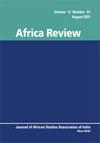公元第二个千年人类对气候变化的反应
IF 0.5
Q4 AREA STUDIES
引用次数: 0
摘要
从公元 700年到 1450年,南部非洲过去的文明史引发了关于这些强大国家的社会复杂性和最终衰落的悬而未决的争论。本文的目的是通过考虑人类对持续干旱和干旱期的反应,从环境的角度研究非洲南部马蓬古布韦和大津巴布韦国家系统的历史。支持这项研究的理论来源于当代社会对津巴布韦南部Bikita和Chivi地区类似环境困难的反应。利用降雨数据,以及对酋长、村民、农民和专家的采访,这项研究指出,干旱的发生和干旱期的经历会干扰社会政治组织。可持续性、复原力和转型的概念被用来解释在公元第二个千年面对持续干旱和干旱期时南部非洲社会可能发生的情况。本文章由计算机程序翻译,如有差异,请以英文原文为准。
Human Responses to Climate Change in the Second Millennium AD
The history of past civilisations in southern Africa from AD 700 to AD 1450 has engendered unresolved debates on the social complexities and ultimate decline of these powerful states. The purpose of this paper is to examine the history of the Mapungubwe and Great Zimbabwe state systems in southern Africa through an environmental perspective by taking into consideration human responses to persistent droughts and dry spells. The theories underpinning this study are derived from contemporary societal responses to similar environmental hardships in the Bikita and Chivi districts of southern Zimbabwe. Using rainfall data, and interviews with chiefs, villagers, farmers and experts, this study notes that the occurrence of droughts and dry-spell experiences interfere with sociopolitical organisation. The concepts of sustainability, resilience and transformation are used to explain what could have transpired in societies in southern Africa in the second millennium AD in the face of persistent droughts and dry spells.
求助全文
通过发布文献求助,成功后即可免费获取论文全文。
去求助
来源期刊

Africa Review
AREA STUDIES-
CiteScore
1.80
自引率
12.50%
发文量
22
期刊介绍:
Africa Review is an interdisciplinary academic journal of the African Studies Association of India (ASA India) and focuses on theoretical, historical, literary and developmental enquiries related to African affairs. The central aim of the journal is to promote a scholarly understanding of developments and change in Africa, publishing both original scholarship on developments in individual countries as well as comparative analyses examining the wider region. The journal serves the full spectrum of social science disciplinary communities, including anthropology, archaeology, history, law, sociology, demography, development studies, economics, education, gender studies, industrial relations, literature, politics and urban studies.
 求助内容:
求助内容: 应助结果提醒方式:
应助结果提醒方式:


